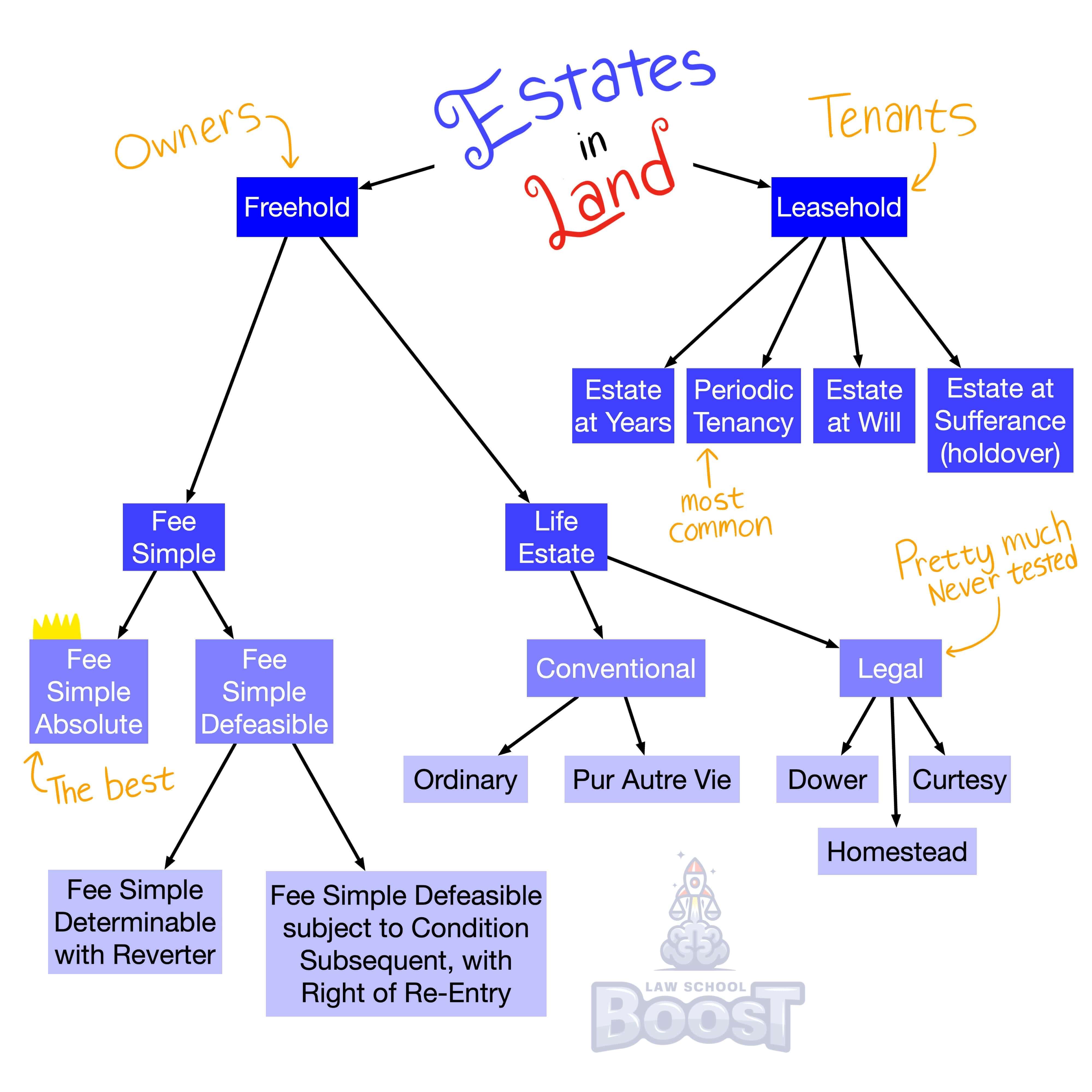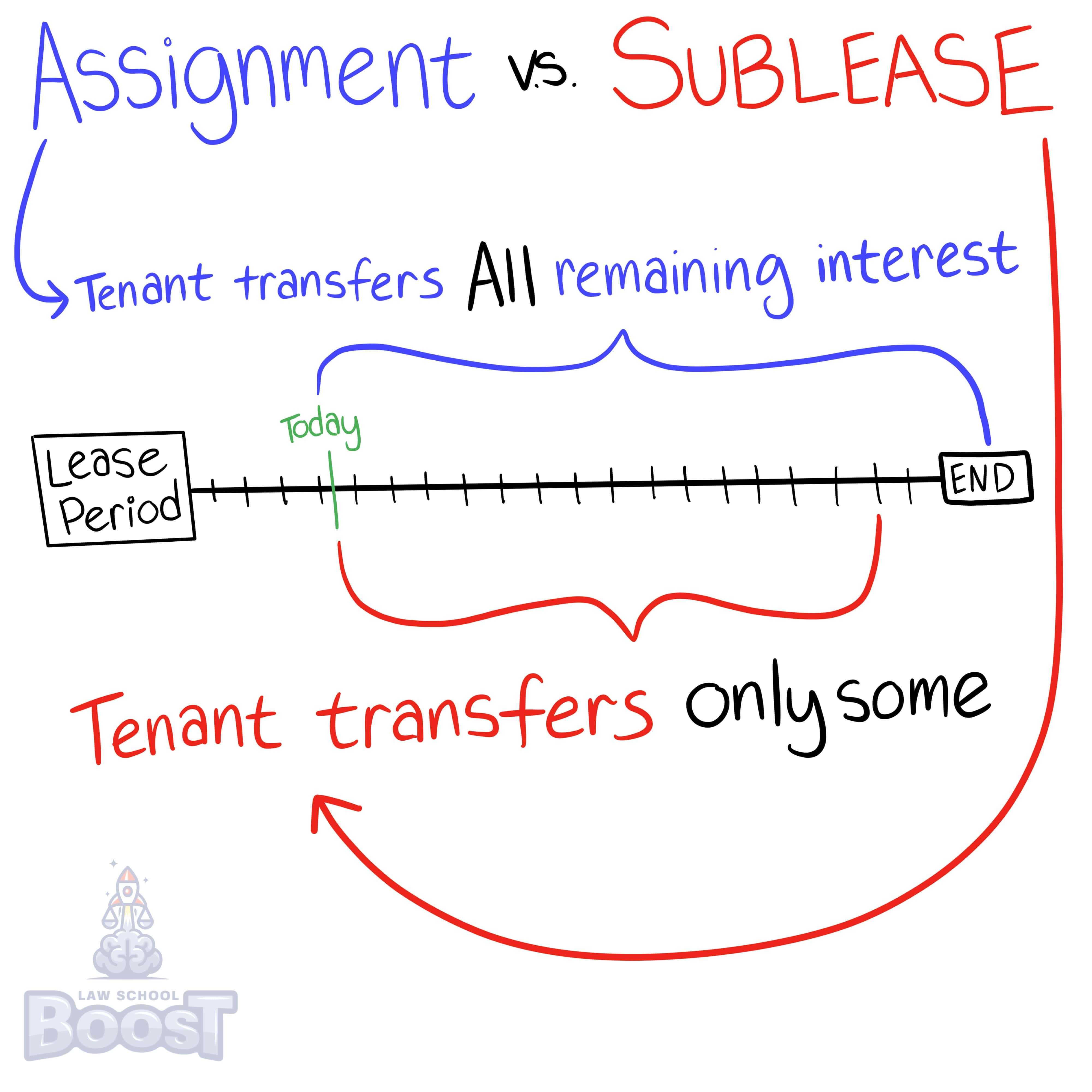😀
Real Property • Landlord-Tenant
PROP#088
Legal Definition
The assignee and the landlord are in privity of estate, thus each is liable to the other for covenants in the lease that run with the land. Rent always runs with the land, so the assignee owes rent directly to the landlord. While the original tenant is no longer in privity of estate, he remains liable to the landlord because the two parties are still in privity of contract.
Plain English Explanation
When one tenant assigns their lease to a third party, we need to figure out who owes duties to who, and what rights the new parties have. In other words, when Amy rents property from Bob and signs a lease with him, it's clear that Amy is the tenant and Bob is the landlord, and Amy has duties to Bob, and Bob has duties to Amy. But when Amy assigns her lease to Carl, which duties does Carl owe to Bob? And which duties does Bob owe Carl? And why do they owe each other duties?
First, we look to something called privity of estate. "Privity" means a relation between two parties that is recognized by law. You'll bump into "privity" in many of your law classes, like contract law. Privity of estate means there is a legal relationship between parties because they share a legal interest in property. In other words, even though Carl has never met Bob, and even though Carl did not sign a lease with Bob, Bob is the landlord and Carl is the new tenant on Bob's property, so through privity of estate, Carl owes duties to Bob and Bob owes duties to Carl.
Which duties? Those that "run with the land", meaning obligations that are always, legally associated with the land itself. One such obligation is paying rent. Carl must pay rent to Bob. But what happens if Carl decides not to pay rent to Bob? Then Bob can go after Amy.
Even though Amy is no longer Bob's tenant, and no longer in privity of estate, Amy signed a contract with Bob (the lease), which means Amy is still in privity of contract with Bob. This effectively makes Amy liable for Carl's use of the property.
Knowing these distinctions is important because when you argue that a landlord has the right to force a current or former tenant to do something, that right will either be due to privity of estate (because the person is in possession of the property) or because privity of contract (because the person signed a contract with the landlord).
First, we look to something called privity of estate. "Privity" means a relation between two parties that is recognized by law. You'll bump into "privity" in many of your law classes, like contract law. Privity of estate means there is a legal relationship between parties because they share a legal interest in property. In other words, even though Carl has never met Bob, and even though Carl did not sign a lease with Bob, Bob is the landlord and Carl is the new tenant on Bob's property, so through privity of estate, Carl owes duties to Bob and Bob owes duties to Carl.
Which duties? Those that "run with the land", meaning obligations that are always, legally associated with the land itself. One such obligation is paying rent. Carl must pay rent to Bob. But what happens if Carl decides not to pay rent to Bob? Then Bob can go after Amy.
Even though Amy is no longer Bob's tenant, and no longer in privity of estate, Amy signed a contract with Bob (the lease), which means Amy is still in privity of contract with Bob. This effectively makes Amy liable for Carl's use of the property.
Knowing these distinctions is important because when you argue that a landlord has the right to force a current or former tenant to do something, that right will either be due to privity of estate (because the person is in possession of the property) or because privity of contract (because the person signed a contract with the landlord).
Hypothetical
Hypo 1: Amy rents Blackacre from Bob and signs a 1 year lease. Blackacre is a large parcel of grass with a house on it. After 3 months, Amy assigns her lease to Carl. Carl moves in and decides he no longer likes to be surrounded by so much grass because he hates bugs. As such, he begins tearing it up and salting the earth so nothing will grow and all the bugs die. Bob stops by the property and sees all the damage to Blackacre. Result: Bob can sue Carl for damage, even though he doesn't have a contract with Carl, under privity of estate. If Carl cannot afford to cover the cost of the damage, Bob can sue Amy as well, under privity of contract.
Visual Aids


Related Concepts
How do lease covenants affect a landlord-tenant relationship where one party breaches?
How may a landlord waive a covenant prohibiting assignment?
If a leasehold is condemned or taken via eminent domain, what is the effect on a tenant's duty to pay rent?
If a tenant breaches one or more of their duties, what remedies are available to the landlord?
If a tenant violates a covenant against assignment or sublease, what remedies are available to the landlord?
In a landlord-tenant relationship, who has a duty of restoration when the premises being leased are destroyed due to no fault of either party?
In assessing a landlord's tort liability, what six duties does a landlord have to make the premises safe?
In assessing a landlord-tenant issue, what is an assignment?
In assessing a landlord-tenant relationship, what are the landlord's duties?
In assessing a landlord-tenant relationship, what are the tenant's duties?
In assessing a landlord-tenant relationship, what is the result of a tenant's covenant to repair?
What are the exceptions to the hold-over doctrine?
What constitutes a constructive eviction?
What constitutes an actual eviction?
What constitutes a partial eviction?
What is a landlord's duty to deliver possession?
What is a landlord's duty to provide quiet enjoyment?
What is a landlord's duty to repair?
What is a leasehold estate?
What is a periodic tenancy and how does it terminate?
What is a retaliatory eviction?
What is a sublease?
What is a tenancy at sufferance and how does it terminate?
What is a tenancy at will and how does it terminate?
What is a tenancy for years and how does it terminate?
What is a tenant's duty to not use the premises for an illegal purpose?
What is a tenant's duty to pay rent, and how does it affect their security deposit?
What is a tenant's duty to repair?
What is the hold-over doctrine?
What is the implied warranty of habitability, and what remedies are available to the tenant if breached?
When does a covenant run with the land?
When does a tenant cause ameliorative waste?
When does a tenant cause permissive waste?
When does a tenant cause voluntary waste?


